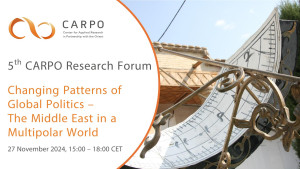CARPO Research Forum
27. November 2024, 15:00 – 18:00
(CET)
online
The fifth edition of the CARPO Research Forum (CRF), titled Changing Patterns of Global Politics – The Middle East in a Multipolar World, took place on 27 November 2024. It brought together experts to discuss reconfigurations in relationships between the Middle East and the so-called Global South in a context of an increasingly multipolar world order. Specifically, discussions focused on the Middle East’s realignment towards Sub-Saharan Africa and Central Asia, looking at the different roles Middle Eastern states have taken on, such as in conflict mediation, development cooperation, investment in sustainable technologies, energy diversification, and cultural and sports engagements. Lastly, the CRF focussed on what these developments mean for the European stakeholders such as the European Union (EU) and its member states.
The choice for this year’s CRF topic was inspired both by a recent panel discussion titled Enhancing Green Regional Cooperation in the Middle East and Central Asia, which CARPO organized in Tashkent, Uzbekistan, together with the Green University of Tashkent, as well as its West Asian and Sub-Sahara African Partnerships in Flux – project, which runs from March 2023 until February 2027.
The keynote speech was provided by Simon Mabon, Professor of International Politics at Lancaster University, who addressed the challenges currently facing the rules-based international order and how these relate to a multipolar world. He asked what a ‘newly’ shaped world order would look like, pointing to events such as the war in Ukraine and the war on Gaza. Will it signify a change of order, or a change in order? This shifting of relations between states in a changing world order provided the theoretical framework for the subsequent sessions, which examined the relationships between the Middle East and Sub-Saharan Africa, as well as Central Asia.
The first session focused on relations between the Gulf countries and Iran, and Sub-Saharan African (SSA) states, and included Hubert Kinkoh, Senior Researcher at CARPO, Maddalena Procopio, Senior Policy Fellow at the European Council on Foreign Relations (ECFR) and Hamid Talebian, Research Fellow at the German Institute for Global and Area Studies (GIGA).
The speakers recognized that relations between Gulf-states and countries in SSA have intensified over the past decades, as both regions are increasingly diversifying their external ties on multiple levels. However, one speaker stressed the importance of distinguishing between the different approaches Gulf states take toward SSA. For example, Saudi Arabia and the United Arab Emirates (UAE), while sharing interests in SSA – such as access to natural resources – pursue distinct strategies. The UAE has taken a more proactive stance, particularly in investing in energy resources, whereas Saudi Arabia’s involvement in the African continent tends to be more risk averse.
When it comes to Iran, a historical perspective shows that it has considered partnerships with SSA countries of importance both for its recognition on the international stage, as well as for defence cooperation and what has been referred to as ‘civilizational geopolitics’. For SSA countries, their engagement with new regions can be read as a critique to the traditional Western partners but is also driven by economic necessity and a desire to diversify diplomatic and security relations. However, speakers cautioned that these emerging partnerships must focus on fostering long-term development and be accompanied by good governance if they are to remain sustainable.
The second session focused on relations between the Middle East and Central Asia. It featured Esfandyar Batmanghelidj from the Bourse&Bazaar Foundation, Akram Umarov, First Vice-Rector at the University of World Economy and Diplomacy in Tashkent, and Layla Ali, Researcher at the Gulf Research Center.
The panel explored the emerging alliances of Central Asia as the region seeks economic sovereignty and diversifies its global partnerships. Looking at the region from the perspective of the Gulf states, Central Asia offers fertile ground for investments in renewable energy and green technologies, aligning with their efforts toward economic diversification. In addition, speakers highlighted the growing exchanges between Gulf states and Central Asia in the domains of education and culture, further solidifying the relationship on a people-to-people level. For Iran, Central Asia was mentioned to be interesting for developing trade routes and regional integration, although its possibilities are limited due to the international sanctions.
Yet, speakers also pointed to the challenges facing further cooperation between the Middle East and Central Asia, including the potential spill-over effects of regional conflicts as well as internal challenges within Central Asia. Concerning the latter, speakers mentioned that Central Asian countries often follow personalist policies that can shift with a change of government. And while the GCC model is well integrated, the different Central Asian countries have varying economic models which makes a unified approach more challenging. Lastly, there is a risk of Central Asia becoming an area of competition between not only Middel Eastern states, but also international actors, rather than a platform for cooperation.
In her concluding remarks Kristina Kausch, Researcher, Deputy Managing Director and Senior Fellow, German Marshall Fund South, reflected on what these developments mean for the EU. In a context of shifting geopolitical relations and middle powers emerging with their own geopolitical strategies, the EU finds itself struggling to remain relevant on the international stage. The EU faces significant issues in both its policies and discourse as it seeks to diversify within a multipolar order. Yet, as was mentioned during the CRF, opportunities remain – particularly in conflict resolution – if the EU collaborates with emerging middle powers.

